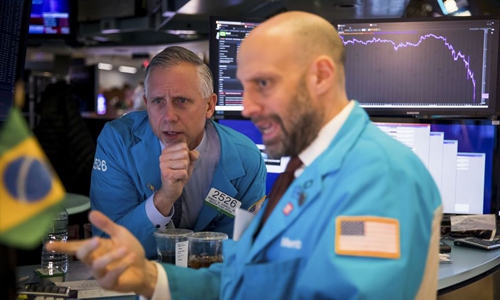HOME >> SOURCE
US House passes coronavirus rescue package to shore up economy
Source:Xinhua Published: 2020/3/15 8:02:52

Traders work at the New York Stock Exchange (NYSE) in New York, the United States, on March 12, 2020. (Xinhua)
The US House of Representatives early Saturday morning passed a coronavirus rescue package in response to the virus that has the nation in a panic. The bill includes 1 billion US dollars in food aid, increases free testing and provides benefits to Americans who are out sick from work.
The bill is not only aimed at protecting Americans from the virus that is sweeping across the globe, but is also an effort to stave off the disastrous impact the coronavirus could have on the economy.
Indeed, the virus has wreaked havoc on US markets, this week sparking the sharpest sell-off in decades, with the Dow Jones Industrial Average diving from all-time highs of 29,000 just three weeks ago to as low as 21,200 at one point, ending the week's trading at 23,185.
The bill was passed at a time when many workplaces are shutting down, in a bid to protect employees from potential exposure to the virus, which has now killed more than 40 Americans.
The bill was backed by US President Donald Trump, who expressed his approval in a tweet, and pushed through the House by Speaker Nancy Pelosi, in a rare show of bipartisan cooperation.
The bill was passed in an expedited manner, skipping over many of the time-consuming procedural hurdles, in a bid to put it into action fast. The Senate is expected to take up the bill as soon as Monday.
"Good teamwork between Republicans & Democrats as the House passes the big CoronaVirus Relief Bill. People really pulled together. Nice to see!" Trump tweeted Saturday morning.
CAN WASHINGTON SAVE THE US ECONOMY?
But experts harbor myriad opinions on whether Washington legislation, such as this bill, or even a full-on stimulus package, would be the silver bullet that would save the economy from the virus' negative impacts.
With many Americans beginning to stay home from work - and likely more to follow - the economy could see a slide in production that could slow the economy, economists warned.
At the same time, with many Americans staying home and spending less money on restaurants, events and travel, the economy could see a slump in demand. Some economists are even predicting a recession.
"US economic activity is bound to decline significantly as travel is restricted, events are canceled, and workers are told to work from home," Desmond Lachman, a resident fellow at the American Enterprise Institute, told Xinhua.
"No amount of government stimulus will prevent those factors from dragging down the US economy," Lachman said.
With the stock market now having declined by around 25 percent, thereby wiping out around 7.5 trillion US dollars in household wealth, demand is bound to decline sharply, he added.
Writing in The National Review earlier this week, US Senator for Florida Marco Rubio argued that the stimulus steps Washington is taking are necessary, but added that "no amount of consumer stimulus is going to offset the rational fears that people have of gathering in crowded spaces."
"Nor will it offset the economic impact of canceled conferences or events. Businesses that provide services are experiencing a demand shock due to the virus, so while throwing cash at them may keep them from going bankrupt, it will not be sufficient to stop an economic contraction," the senator argued.
The Heritage Foundation recommended a temporary tax cut, which would be lifted when the virus was no longer a threat. The "epidemic tax cut" would provide income support for those workers whose incomes are threatened by the epidemic.
It would also discourage people from congregating at workplaces where they are likely to contract or spread the disease and would discourage people from going to work while sick because they need income, the think tank wrote on its website.
Brookings Institution Senior Fellow Barry Bosworth, however, said in the near term he expects the economy to snap back quickly, in what economists are calling a "v shape" recovery - a sharp decline followed by a robust recovery.
Posted in: ECONOMY,BIZ FOCUS